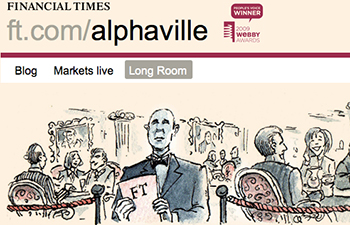What determines a successful community? The number of unique visitors or page views? The number of comments?
Those metrics can be important, but there are also qualitative aspects to consider. Are the discussions on your site respectful and insightful? Are members deriving value from the community? Or are you hosting flame wars that lack intelligence and decorum?
In order to create a community of quality, perhaps it makes sense to cut down on quantity, and create an exclusive members-only structure. Few media companies have done a better job of building this kind of exclusive community than the Financial Times. Its Long Room was created as part of the paper’s FT Alphaville blog. The Long Room is an “exclusive comment and analysis arena, where finance professionals are invited to share their research and offer thoughts on the work of others.”
In order to learn more about how the Long Room has created an exclusive community of value, I spoke with New York-based Alphaville editor Paul Murphy.
Some Background and Context
It’s important to first understand that Alphaville and the Financial Times are unique properties. The newspaper’s website, FT.com, has a frequency-based pay wall. This means you can read a set number of articles for free, but have to subscribe if you exceed that number.
However, Alphaville is a free daily news and commentary service. Its mission is to give “financial market professionals the information they need, when they need it.” On a typical day, the blog gets between 40,000 and 50,000 unique visitors. It generates roughly 500,000 uniques per month.

Alphaville was launched roughly three years ago. Murphy said the goal is to serve a community of “deep specialists in their respective areas. They know more than we journalists know.”
In addition to the blog, Alphaville offers email newsletters, news alerts, and Markets Live, a kind of chat session where two journalists instant message each other about the financial markets. (The community can also add comments in real time.) Alphaville also regularly links to news and reporting generated by other media outlets.
“We are a blog and we acknowledge that people are promiscuous,” Murphy said. “So we tell them what to read elsewhere if they have half an hour of spare time, and we tell them what they should read in the FT. Being financial professionals, it’s a navigational service. We allow them to sample.”
The Long Room
The Long Room exists as an extension of Alphaville. It is “an exclusive comment and analysis arena, where finance professionals are invited to share their research and offer thoughts on the work of others.” It is free to join, if you can get through the vetting process to be accepted.
The Long Room was inspired by a famous restaurant in the City of London that was a favorite haunt of financial pundits and market movers during the 1980s. The online version of the Long Room aims to be as exclusive as the real-world place. The site says it clearly: “The Long Room is reserved for financial professionals and for people with a clear understanding of how financial markets and products work. Our members-only policy and application vetting process allow us to ensure that these criteria are met.”
Indeed, when a colleague of mine applied for membership, he received a call from London informing him that he had been accepted. But they also told him that he could not report the discussions taking place in the Long Room. “What happens in the Long Room stays in the Long Room,” he was told.
Murphy confirms the application process is taken seriously. In fact, he handles many applications personally. He said the Long Room’s exclusivity and careful vetting process have helped it reach the target group of financial experts and decision-makers: “I’m really impressed by the seniority of the people applying for the Long Room,” he said.
Listening to the Community
The Long Room is an example of how intimate knowledge of a community can lead to a compelling service. The Alphaville team discovered that there was a willingness among financial specialists to share ideas and research, and so they created a safe place that encouraged them to do so.
“We simulated the way groups of financial professionals operate in the real world: in small email communities of 20 to 30 people,” Murphy said. “They are trading research and commentary, and we wanted this functionality [as part of the Long Room].”
Murphy said the sharing of research and insight had to be done “in a walled garden in order to give them a certain comfort level.”
The discussions inside the Long Room are organized using topic-specific “tables,” such as those dedicated to market strategy or finance 2.0. Members can apply to host a table. So far, Murphy said, everyone is getting along well. (He mentioned one case when a person was kicked out because they engaged in constant self-promotion.)
Why it Works
Alphaville has been profitable since its earliest days. “It’s a very light structure, especially compared to a newspaper, which typically requires a massive industrial process,” Murphy said. The Long Room also enables the Financial Times to gather important insight about its readers. This information helps the paper sell itself — and its special community — to advertisers.
Alphaville also helps the Financial Times enhance its position as a hub for the financial community in London and beyond. This unique focus is a big factor in the structure and success of the Long Room. Financial professionals need timely and correct information, and so they can’t ignore the Financial Times (or the Wall Street Journal).
But the question remains whether or not this kind of exclusive community could work at other newspapers and news organizations.
For his part, Murphy has no doubt.
“The model is applicable elsewhere, whether we talk about cycling or tennis communities,” he said.
*****
What’s your take on this “exclusive” strategy? Do you think it’s elitist, or that it introduces an element of civility in online interactions? Could this strategy be used by other media organizations? Finally, a last question for the MediaShift community: could this approach help media to survive financially?
Roland Legrand is in charge of Internet and new media at Mediafin, the publisher of leading Belgian business newspapers De Tijd and L’Echo. He studied applied economics and philosophy. After a brief teaching experience, he became a financial journalist working for the Belgian wire service Belga and subsequently for Mediafin. He works in Brussels, and lives in Antwerp with his wife Liesbeth.


Thank you very much for sharing your strategy here. It’s not every day that someone explains their firm’s approach and rationale, especially in the B2B financial space.
The Financial Times seems to be very forward thinking. They are also turning to crowdsourcing to find ideas for their next online campaign. They are offering $5000 to the person who can come up with the best idea to increase their online subscriptions. Here is a link to the page: http://www.ideabounty.com/latest